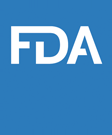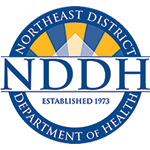Food Service Establishments
Information for food establishment owners
NDDH regularly inspects food service establishments to assure that safe food handling procedures are being followed and that proper safeguards are in place to prevent the spread of food borne illness.
Inspection results are uploaded to our public records database which can be accessed from our
Property and Inspection Records page.
Annual Permitting Reminder
NDDH Annual permits must be renewed by December 15th annually. Payments made after December 15th will incur a mandatory late fee of $90.00. In addition, penalty fees of $12 per NDDH business day are imposed from January 2 through January 15 (to a maximum of $120.00).
Seasonal Permitting Reminder
NDDH Annual permits must be renewed by April 15th annually. Payments made after April 15th will incur a mandatory late fee of $90.00. In addition, penalty fees of $12 per NDDH business day are imposed from April 30 through May 9 (to a maximum of $120.00).
Important Information
* Required to have posted on-premise. Signage will be verified during inspections.

Opening a New Food Service Establishment or Making Renovations
If you plan to open a new food service establishment or before you make any renovations, read and fill out our FSE Plan Review Packet by clicking the button below. It can also be found on our Forms & Applications page under the “Food Service” tab.
Reciprocal Itinerant Food Vendor Program in CT
The State recently introduced a process for reciprocal permitting of itinerant food vendors (IFV). This will allow an IFV with a reciprocal permit from one health district/department to operate in every other participating health district/department. NDDH will be participating in this program. You can find more information and Frequently Asked Questions at the State Website: Itinerant Food Vendors (ct.gov)
- An IFV is basically a food truck. The reciprocal agreement does not apply to any other types of transitory food service such as pushcarts, booths at fairs or events, or other set-ups.
- The reciprocal permit does not apply to multi-day/special events such as fairs, carnivals, or festivals. IFVs will need permits from NDDH to serve food at multi-day or special events that disrupt their standard operating procedures.
- All IFVs will still have to comply with all local ordinances. This requirement is clearly and repeatedly stated in the Frequently Asked Questions documents that describe the new program. It is the responsibility of the IFV to see if there are any applicable local ordinances. These may include:
- Zoning
- Fire
- Parking
- Building
- Peddler’s Permits
- Other Town permits
Farmers Markets
Farmers/vendors are required to register with NDDH by submitting an annual Farmers Market Food License Application for review of specific requirements and guidance in conforming to the regulations of the Connecticut Public Health Code.
NDDH Seasonal Farmers Market Food License Application can be found on our Forms and Permits page.
Additional information for participating in CT Farmer’s Markets and resources can be found on the CT Dept of Agriculture website.
Cottage Food Operators
Cottage Food can be prepared in a home environment without some of the controls used for a traditional ready-to-eat foods.
Information and resources for Cottage Food Operators can be found on the CT Dept of Consumer Protection CFO website.
Wholesale Food Sales
Information for wholesale food sales (Bakery, Non-alcoholic Beverage/Cider, Wholesale and Retail Frozen Desserts and Food Vending Machines) can be found on the CT Dept of Consumer Protection Foods Program website.
Adopting the FDA Model Food Code and What it Means for Food Establishments
Attention Owners/Managers of all food establishments in the twelve towns served by the Northeast District Department of Health: The adoption of the 2022 FDA Model Food Code means significant changes in requirements for all food establishments. Learn how these changes will impact your establishment. NDDH is committed to assisting our food establishments to transition successfully to these new regulations.
See our implementation packet and additional resources below.
Water Contamination/Interruption at Food Service Establishments
Water contamination or interruption of service can drastically impact a food service establishment’s ability to operate. Examples of water emergencies, include, but are not limited to, E. coli contamination, an interruption of water service, or an inadequate supply of water. The following documents are provided by the CT Department of Public Health Food Protection Program to assist food service operators in times of water emergencies:
General Guidance – Water Emergencies at Food Establishments
Bulk Water Hauling at Food Establishments
Interim Measures for E. coli Contamination/Water Supply Interruption at Food Establishments – This documents includes the acceptable corrective actions that must be taken with operations and associated equipment during a water emergency.
Guidelines for Reopening of Food Establishments after a Water Emergency
NDDH encourages all food service establishments to have a business continuity of operations plan (COOP) in place to address operations in times of emergency. Having a plan for service interruption is good for your business… and for the customers who count on you.



